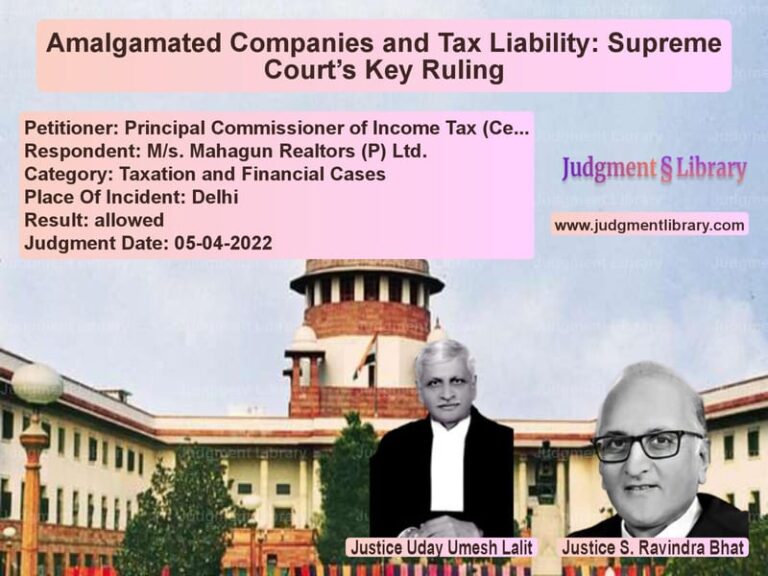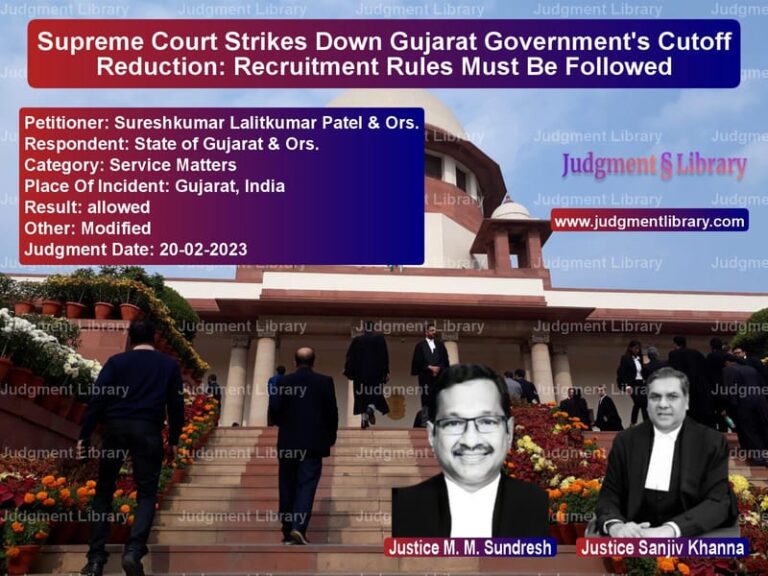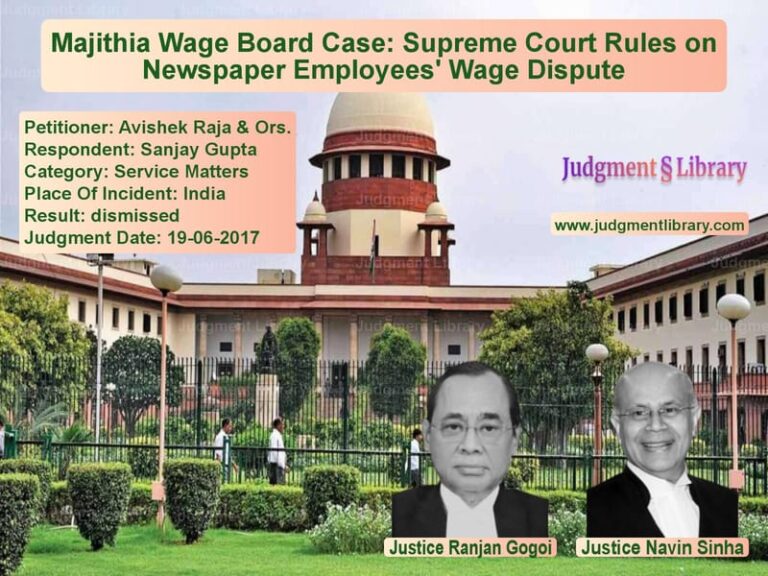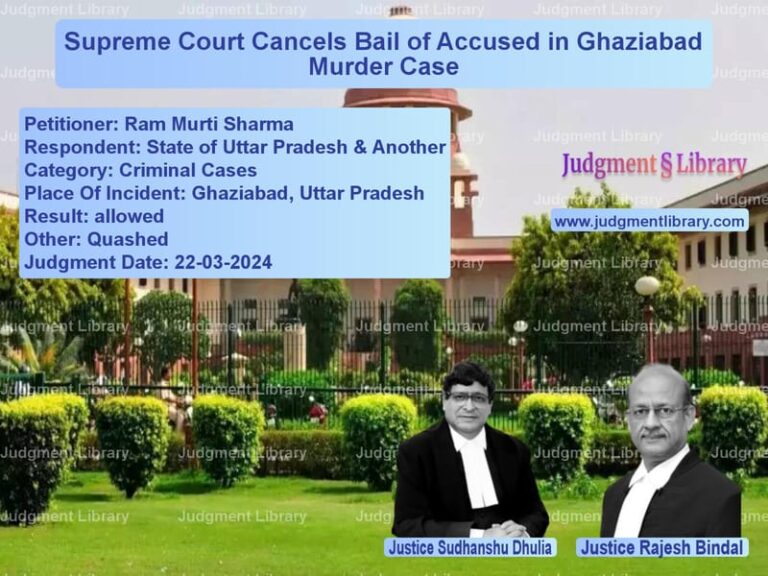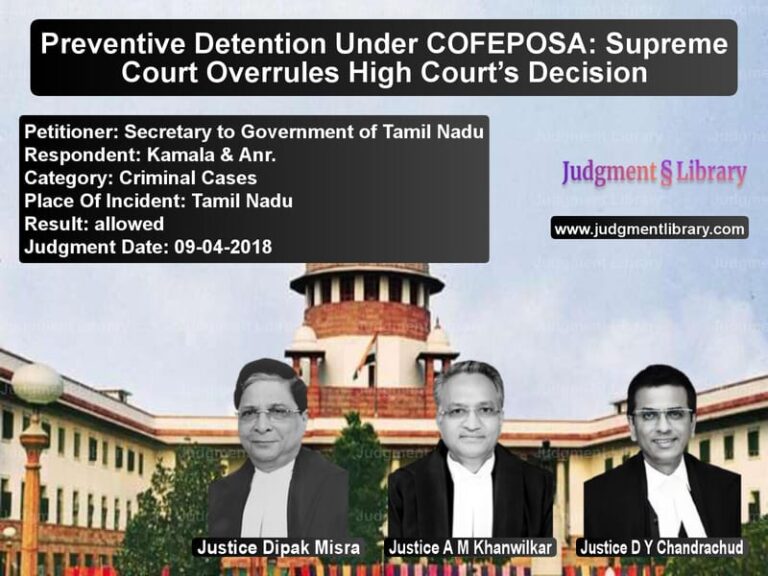Supreme Court Upholds Maharashtra’s Decision on Village Land Protection
The Supreme Court of India recently ruled on a significant case involving the protection of village land and the rights of the Vadar community in Maharashtra. In the case of Maharashtra Rajya Vadar Samaj Sangh v. Union of India & Ors., the petitioner challenged a Government Resolution issued by the Maharashtra Revenue and Forest Department, which ordered the removal of encroachments and unauthorized construction on barren and common village land. The petitioner argued that this resolution infringed upon the rights of the Vadar community, which has traditionally engaged in stone crushing as their ancestral occupation.
Background of the Case
The Maharashtra government issued a resolution on 12.07.2011, following the Supreme Court’s decision in Jagpal Singh & Ors. v. State of Punjab & Ors. (2011), which directed state governments to evict illegal occupants from Gram Sabha and Gram Panchayat lands. The resolution stated that barren land or land meant for public use should not be allotted to private individuals or organizations.
The Vadar community, which belongs to the nomadic tribes category, claimed that the resolution deprived them of their traditional right to extract and remove minor minerals from government land as permitted under the Maharashtra Land Revenue (Extraction and Removal of Minor Minerals) Rules, 1968.
Legal Issues Before the Court
The Supreme Court had to decide:
- Whether the 2011 Government Resolution was unconstitutional and violated the rights of the Vadar community.
- Whether the resolution contradicted Rule 4A of the Maharashtra Land Revenue Rules, 1968, which allows members of the Vadar community to remove up to 200 brass of stone annually without paying a fee or royalty.
- Whether the resolution unlawfully prevented lease renewals for stone extraction by the Vadar community.
Petitioner’s Arguments
The petitioner, Maharashtra Rajya Vadar Samaj Sangh, argued that:
- The resolution violated the community’s fundamental rights by restricting their traditional livelihood of stone crushing.
- The resolution was based on a misinterpretation of the Jagpal Singh case, which aimed to prevent large-scale illegal encroachments, not traditional community practices.
- The resolution effectively nullified Rule 4A of the 1968 Rules, depriving the Vadar community of their legally granted rights.
- The non-renewal of leases to Vadar families for stone extraction was arbitrary and discriminatory.
Respondent’s Arguments
The State of Maharashtra defended the resolution, stating:
- The resolution was in line with the Supreme Court’s 2011 judgment in Jagpal Singh, which mandated the protection of Gram Sabha land.
- The policy was necessary to prevent further encroachment and ensure that village land was preserved for community use.
- Rule 4A only allowed extraction on unassessed government waste land and did not guarantee lease rights on Gram Panchayat land.
- The resolution did not ban stone extraction outright but ensured that public land was not misused for private purposes.
Supreme Court’s Observations
The Supreme Court, after examining the arguments, made the following observations:
- The 2011 resolution was a necessary measure to protect common village land and was consistent with the Jagpal Singh decision.
- The Vadar community’s right to extract stone was subject to government regulations and could not override the larger public interest.
- Rule 4A of the 1968 Rules allowed extraction only on unassessed waste land and did not grant perpetual lease rights on public land.
- The resolution did not violate any constitutional provisions as it aimed to protect village land from unauthorized occupation.
Supreme Court’s Verdict
The Supreme Court, led by Justices M.R. Shah and M.M. Sundresh, dismissed the petition and upheld the Maharashtra government’s resolution. The Court ruled:
- “The impugned Government Resolution dated 12.07.2011 is absolutely in consonance with the directions issued by this Court in Jagpal Singh and must be upheld.”
- “The resolution does not take away the rights of the Vadar community under Rule 4A, but ensures that village land remains available for public use.”
- “If any individual lease renewal is denied, the affected party may challenge it separately through the appropriate legal process.”
Accordingly, the petition was dismissed.
Key Takeaways from the Judgment
This ruling clarifies important legal principles related to land use and community rights:
- Protection of Public Land: The judgment reinforces the Supreme Court’s stance that Gram Sabha and Gram Panchayat land must be safeguarded against unauthorized occupation.
- Regulation of Traditional Rights: While communities have certain customary rights, these must be exercised within the legal framework and cannot infringe upon public interest.
- Judicial Deference to State Policies: The Court recognized that states have the authority to frame policies ensuring the sustainable use of public land.
- Legal Recourse for Leaseholders: The Court allowed individuals affected by lease denials to seek separate remedies rather than invalidating the entire resolution.
Conclusion
The Supreme Court’s ruling in Maharashtra Rajya Vadar Samaj Sangh v. Union of India & Ors. upholds the government’s authority to regulate public land while balancing the rights of traditional communities. The judgment ensures that village land remains protected while allowing affected individuals to seek legal remedies if their lease renewals are denied unfairly. This decision sets an important precedent for similar disputes involving the intersection of community rights and government land policies.
Petitioner Name: Maharashtra Rajya Vadar Samaj Sangh.Respondent Name: Union of India & Ors..Judgment By: Justice M.R. Shah, Justice M.M. Sundresh.Place Of Incident: Maharashtra, India.Judgment Date: 24-11-2022.
Don’t miss out on the full details! Download the complete judgment in PDF format below and gain valuable insights instantly!
Download Judgment: maharashtra-rajya-va-vs-union-of-india-&-ors-supreme-court-of-india-judgment-dated-24-11-2022.pdf
Directly Download Judgment: Directly download this Judgment
See all petitions in Property Disputes
See all petitions in Public Interest Litigation
See all petitions in Landlord-Tenant Disputes
See all petitions in Judgment by Mukeshkumar Rasikbhai Shah
See all petitions in Judgment by M.M. Sundresh
See all petitions in dismissed
See all petitions in supreme court of India judgments November 2022
See all petitions in 2022 judgments
See all posts in Civil Cases Category
See all allowed petitions in Civil Cases Category
See all Dismissed petitions in Civil Cases Category
See all partially allowed petitions in Civil Cases Category


